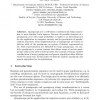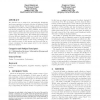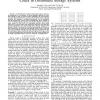45 search results - page 8 / 9 » On Non-Polynomial Latin Squares |
DATESO
2010
13 years 5 months ago
2010
Abstract. Quasigroups are a well-known combinatorial design equivalent to more familiar Latin squares. Because all possible elements of a quasigroup occur with equal probability, i...
JCDL
2011
ACM
12 years 10 months ago
2011
ACM
We describe here a method for automatically identifying word sense variation in a dated collection of historical books in a large digital library. By leveraging a small set of kno...
CORR
2011
Springer
13 years 2 months ago
2011
Springer
Abstract—In distributed storage systems built using commodity hardware, it is necessary to store multiple replicas of every data chunk in order to ensure system reliability. In s...
LATIN
2004
Springer
14 years 21 days ago
2004
Springer
We consider the problem of protein folding in the HP model on the 3D square lattice. This problem is combinatorially equivalent to folding a string of 0’s and 1’s so that the s...
FSE
2007
Springer
14 years 1 months ago
2007
Springer
Abstract. Given (deterministic) ciphers E and E that can encipher messages of l and n bits, respectively, we construct a cipher E∗ = XLS[E, E] that can encipher messages of l + s...



